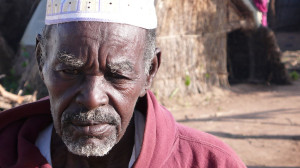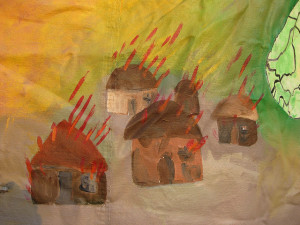Why the UN Security Council should stop the ICC’s efforts to indict al-Bashir
The International Criminal Court’s recent fumbled attempt to try Congolese rebel leader Thomas Lubanga Dyilo is the latest addition to a series of reasons why an ICC indictment of Sudanese president Omar Hassan Ahmad al-Bashir would be unwise.
 Darfur refugee Sam Ouandja
Darfur refugee Sam Ouandja
Photo courtesy of hdptcar on FlickrLubanga’s trial, which began last month after nearly three years of delays, was marred by incompetent handling of its first witness: a former child soldier who withdrew his testimony before the end of the first day, saying he had never served in Lubanga’s army and claiming that a humanitarian aid organization had told him what to say.
The witness had been promised that his identity would be kept a secret, but he took the stand in full view of those in the courtroom, including Lubanga. After he changed his story, it emerged that pre-trial judges had prevented the prosecution from witness proofing, a two-part process where lawyers can walk witnesses through the courtroom before the trial and explain procedure, and where witnesses can practice answering questions and can re-read their own prior testimonies to refresh their memories. Though different countries have different policies on witness proofing, the international criminal tribunals for both the former Yugoslavia and Rwanda and the Special Court for Sierra Leone all chose to allow it, citing its ability to prevent incidents like the one in the Hague last month.
Things are even messier in Sudan, where the ICC announced last July that it is considering indicting al-Bashir on charges of genocide, crimes against humanity and war crimes – a double first for the court, which has neither indicted a sitting head of state nor charged anyone with genocide. Moreno-Ocampo would like to charge al-Bashir with more than 300,000 deaths in Darfur and the internal displacement of nearly three million Sudanese citizens. He claims that the president ordered both Sudanese armed forces and the Janjaweed militia to attack and destroy villages belonging to three separate ethnic groups in Darfur.
 Burning village painting at encampment for Darfur
Burning village painting at encampment for Darfur
Photo courtesy of futureatlas.com on FlickrWhat’s happening in Darfur is despicable, and al-Bashir is undoubtedly responsible – if not for instigating the violence, at least for his failure to attempt to stop it. At the same time, the ICC’s charges, if passed (a decision is expected in November), will carry little weight. Sudan has signed but not ratified the Rome Statute, the act that created the court. This means the country is not legally bound to follow any ICC directives, raising the question of who, exactly, will waltz into Khartoum and slap handcuffs on al-Bashir. When news of the potential arrest warrant broke in July of last year, the deputy foreign minister of South Africa — a country whose post-apartheid Truth and Reconciliation Commission has been praised for its success — admitted that al-Bashir would likely never be arrested and said a warrant would not help bring peace to Darfur.
Even if al-Bashir’s arrest were probable, it would not be immediate, giving him ample time to retaliate against Darfur, something both experts and aid workers in Darfur say is likely. The day after the ICC announced its intentions to investigate al-Bashir, anti-Western riots took place in Khartoum and Darfur. It’s not unthinkable that, were the indictment to become a reality, Sudan might shut its doors to international aid organizations whose presence is still desperately needed in Darfur.
The ICC has a history of missteps in Africa. Its 2005 indictments – the court’s first – of five leaders of the Lord’s Resistance Army, a Ugandan rebel group infamous for child abduction and extreme brutality, are widely blamed for disrupting the peace process in Uganda. LRA leader Joseph Kony reportedly walked out of negotiations with the Ugandan government upon learning of the warrants, and the group, which had eased its attacks in Uganda, has since launched a renewed offensive that included the massacre of nearly 1000 Congolese civilians last December.
In 2007, Ugandan president Yoweri Museveni asked the court to suspend the indictments in favor of a local justice process, hoping to encourage Kony to sign a peace agreement. Chief Prosecutor Luis Moreno-Ocampo refused, and Kony is still in hiding as his troops pillage their way through northeastern Congo.
Article 16 of the Rome Statute gives the UN Security Council the power to put the ICC’s decision on hold indefinitely for any reason. Both the African Union and the Organisation of the Islamic Conference have pressured the Security Council to invoke the article, provided al-Bashir agrees to make a good faith effort toward peace in Darfur. Suspending the prosecution, if only temporarily, would avoid increased bloodshed and would allow the ICC to work through its trial issues with Lubanga before embarking on yet another case. If the ICC’s handling of the Uganda and Democratic Republic of the Congo cases are any indication of the court’s ability to carry out their mandate in the best interests of African conflicts’ victims, the Security Council should comply.
Crossposted on The Morningside Post and The Huffington Post (albeit with a disappointing typo in the title)

